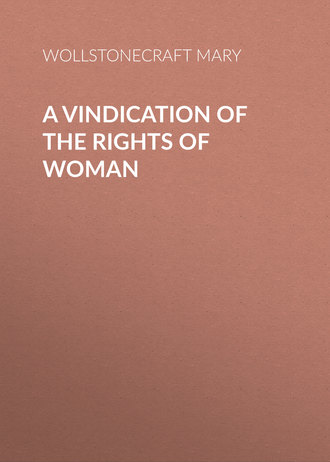 полная версия
полная версияA Vindication of the Rights of Woman
At twenty the beauty of both sexes is equal; but the libertinism of man leads him to make the distinction, and superannuated coquettes are commonly of the same opinion; for when they can no longer inspire love, they pay for the vigour and vivacity of youth. The French who admit more of mind into their notions of beauty, give the preference to women of thirty. I mean to say, that they allow women to be in their most perfect state, when vivacity gives place to reason, and to that majestic seriousness of character, which marks maturity; or, the resting point. In youth, till twenty the body shoots out; till thirty the solids are attaining a degree of density; and the flexible muscles, growing daily more rigid, give character to the countenance; that is, they trace the operations of the mind with the iron pen of fate, and tell us not only what powers are within, but how they have been employed.
It is proper to observe, that animals who arrive slowly at maturity, are the longest lived, and of the noblest species. Men cannot, however, claim any natural superiority from the grandeur of longevity; for in this respect nature has not distinguished the male.
Polygamy is another physical degradation; and a plausible argument for a custom, that blasts every domestic virtue, is drawn from the well-attested fact, that in the countries where it is established, more females are born than males. This appears to be an indication of nature, and to nature apparently reasonable speculations must yield. A further conclusion obviously presents itself; if polygamy be necessary, woman must be inferior to man, and made for him.
With respect to the formation of the foetus in the womb, we are very ignorant; but it appears to me probable, that an accidental physical cause may account for this phenomenon, and prove it not to be a law of nature. I have met with some pertinent observations on the subject in Forster's Account of the Isles of the South Sea, that will explain my meaning. After observing that of the two sexes amongst animals, the most vigorous and hottest constitution always prevails, and produces its kind; he adds,—"If this be applied to the inhabitants of Africa, it is evident that the men there, accustomed to polygamy, are enervated by the use of so many women, and therefore less vigorous; the women on the contrary, are of a hotter constitution, not only on account of their more irritable nerves, more sensitive organization, and more lively fancy; but likewise because they are deprived in their matrimony of that share of physical love which in a monogamous condition, would all be theirs; and thus for the above reasons, the generality of children are born females."
"In the greater part of Europe it has been proved by the most accurate lists of mortality, that the proportion of men to women is nearly equal, or, if any difference takes place, the males born are more numerous, in the proportion of 105 to 100."
The necessity of polygamy, therefore, does not appear; yet when a man seduces a woman, it should I think, be termed a LEFT-HANDED marriage, and the man should be LEGALLY obliged to maintain the woman and her children, unless adultery, a natural divorcement, abrogated the law. And this law should remain in force as long as the weakness of women caused the word seduction to be used as an excuse for their frailty and want of principle; nay, while they depend on man for a subsistence, instead of earning it by the exercise of their own hands or heads. But these women should not in the full meaning of the relationship, be termed wives, or the very purpose of marriage would be subverted, and all those endearing charities that flow from personal fidelity, and give a sanctity to the tie, when neither love nor friendship unites the hearts, would melt into selfishness. The woman who is faithful to the father of her children demands respect, and should not be treated like a prostitute; though I readily grant, that if it be necessary for a man and woman to live together in order to bring up their offspring, nature never intended that a man should have more than one wife.
Still, highly as I respect marriage, as the foundation of almost every social virtue, I cannot avoid feeling the most lively compassion for those unfortunate females who are broken off from society, and by one error torn from all those affections and relationships that improve the heart and mind. It does not frequently even deserve the name of error; for many innocent girls become the dupes of a sincere affectionate heart, and still more are, as it may emphatically be termed, RUINED before they know the difference between virtue and vice: and thus prepared by their education for infamy, they become infamous. Asylums and Magdalens are not the proper remedies for these abuses. It is justice, not charity, that is wanting in the world!
A woman who has lost her honour, imagines that she cannot fall lower, and as for recovering her former station, it is impossible; no exertion can wash this stain away. Losing thus every spur, and having no other means of support, prostitution becomes her only refuge, and the character is quickly depraved by circumstances over which the poor wretch has little power, unless she possesses an uncommon portion of sense and loftiness of spirit. Necessity never makes prostitution the business of men's lives; though numberless are the women who are thus rendered systematically vicious. This, however, arises, in a great degree, from the state of idleness in which women are educated, who are always taught to look up to man for a maintenance, and to consider their persons as the proper return for his exertions to support them. Meretricious airs, and the whole science of wantonness, has then a more powerful stimulus than either appetite or vanity; and this remark gives force to the prevailing opinion, that with chastity all is lost that is respectable in woman. Her character depends on the observance of one virtue, though the only passion fostered in her heart—is love. Nay the honour of a woman is not made even to depend on her will.
When Richardson makes Clarissa tell Lovelace that he had robbed her of her honour, he must have had strange notions of honour and virtue. For, miserable beyond all names of misery is the condition of a being, who could be degraded without its own consent! This excess of strictness I have heard vindicated as a salutary error. I shall answer in the words of Leibnitz—"Errors are often useful; but it is commonly to remedy other errors."
Most of the evils of life arise from a desire of present enjoyment that outruns itself. The obedience required of women in the marriage state, comes under this description; the mind, naturally weakened by depending on authority, never exerts its own powers, and the obedient wife is thus rendered a weak indolent mother. Or, supposing that this is not always the consequence, a future state of existence is scarcely taken into the reckoning when only negative virtues are cultivated. For in treating of morals, particularly when women are alluded to, writers have too often considered virtue in a very limited sense, and made the foundation of it SOLELY worldly utility; nay, a still more fragile base has been given to this stupendous fabric, and the wayward fluctuating feelings of men have been made the standard of virtue. Yes, virtue as well as religion, has been subjected to the decisions of taste.
It would almost provoke a smile of contempt, if the vain absurdities of man did not strike us on all sides, to observe, how eager men are to degrade the sex from whom they pretend to receive the chief pleasure of life; and I have frequently, with full conviction, retorted Pope's sarcasm on them; or, to speak explicitly, it has appeared to me applicable to the whole human race. A love of pleasure or sway seems to divide mankind, and the husband who lords it in his little harem, thinks only of his pleasure or his convenience. To such lengths, indeed, does an intemperate love of pleasure carry some prudent men, or worn out libertines, who marry to have a safe companion, that they seduce their own wives. Hymen banishes modesty, and chaste love takes its flight.
Love, considered as an animal appetite, cannot long feed on itself without expiring. And this extinction, in its own flame, may be termed the violent death of love. But the wife who has thus been rendered licentious, will probably endeavour to fill the void left by the loss of her husband's attentions; for she cannot contentedly become merely an upper servant after having been treated like a goddess. She is still handsome, and, instead of transferring her fondness to her children, she only dreams of enjoying the sunshine of life. Besides, there are many husbands so devoid of sense and parental affection, that during the first effervescence of voluptuous fondness, they refuse to let their wives suckle their children. They are only to dress and live to please them: and love, even innocent love, soon sinks into lasciviousness when the exercise of a duty is sacrificed to its indulgence.
Personal attachment is a very happy foundation for friendship; yet, when even two virtuous young people marry, it would, perhaps, be happy if some circumstance checked their passion; if the recollection of some prior attachment, or disappointed affection, made it on one side, at least, rather a match founded on esteem. In that case they would look beyond the present moment, and try to render the whole of life respectable, by forming a plan to regulate a friendship which only death ought to dissolve.
Friendship is a serious affection; the most sublime of all affections, because it is founded on principle, and cemented by time. The very reverse may be said of love. In a great degree, love and friendship cannot subsist in the same bosom; even when inspired by different objects they weaken or destroy each other, and for the same object can only be felt in succession. The vain fears and fond jealousies, the winds which fan the flame of love, when judiciously or artfully tempered, are both incompatible with the tender confidence and sincere respect of friendship.
Love, such as the glowing pen of genius has traced, exists not on earth, or only resides in those exalted, fervid imaginations that have sketched such dangerous pictures. Dangerous, because they not only afford a plausible excuse to the voluptuary, who disguises sheer sensuality under a sentimental veil; but as they spread affectation, and take from the dignity of virtue. Virtue, as the very word imports, should have an appearance of seriousness, if not austerity; and to endeavour to trick her out in the garb of pleasure, because the epithet has been used as another name for beauty, is to exalt her on a quicksand; a most insidious attempt to hasten her fall by apparent respect. Virtue, and pleasure are not, in fact, so nearly allied in this life as some eloquent writers have laboured to prove. Pleasure prepares the fading wreath, and mixes the intoxicating cup; but the fruit which virtue gives, is the recompence of toil: and, gradually seen as it ripens, only affords calm satisfaction; nay, appearing to be the result of the natural tendency of things, it is scarcely observed. Bread, the common food of life, seldom thought of as a blessing, supports the constitution, and preserves health; still feasts delight the heart of man, though disease and even death lurk in the cup or dainty that elevates the spirits or tickles the palate. The lively heated imagination in the same style, draws the picture of love, as it draws every other picture, with those glowing colours, which the daring hand will steal from the rainbow that is directed by a mind, condemned, in a world like this, to prove its noble origin, by panting after unattainable perfection; ever pursuing what it acknowledges to be a fleeting dream. An imagination of this vigorous cast can give existence to insubstantial forms, and stability to the shadowy reveries which the mind naturally falls into when realities are found vapid. It can then depict love with celestial charms, and dote on the grand ideal object; it can imagine a degree of mutual affection that shall refine the soul, and not expire when it has served as a "scale to heavenly;" and, like devotion, make it absorb every meaner affection and desire. In each other's arms, as in a temple, with its summit lost in the clouds, the world is to be shut out, and every thought and wish, that do not nurture pure affection and permanent virtue. Permanent virtue! alas! Rousseau, respectable visionary! thy paradise would soon be violated by the entrance of some unexpected guest. Like Milton's, it would only contain angels, or men sunk below the dignity of rational creatures. Happiness is not material, it cannot be seen or felt! Yet the eager pursuit of the good which every one shapes to his own fancy, proclaims man the lord of this lower world, and to be an intelligential creature, who is not to receive, but acquire happiness. They, therefore, who complain of the delusions of passion, do not recollect that they are exclaiming against a strong proof of the immortality of the soul.
But, leaving superior minds to correct themselves, and pay dearly for their experience, it is necessary to observe, that it is not against strong, persevering passions; but romantic, wavering feelings, that I wish to guard the female heart by exercising the understanding; for these paradisiacal reveries are oftener the effect of idleness than of a lively fancy.
Women have seldom sufficient serious employment to silence their feelings; a round of little cares, or vain pursuits, frittering away all strength of mind and organs, they become naturally only objects of sense. In short, the whole tenor of female education (the education of society) tends to render the best disposed, romantic and inconstant; and the remainder vain and mean. In the present state of society, this evil can scarcely be remedied, I am afraid, in the slightest degree; should a more laudable ambition ever gain ground, they may be brought nearer to nature and reason, and become more virtuous and useful as they grow more respectable.
But I will venture to assert, that their reason will never acquire sufficient strength to enable it to regulate their conduct, whilst the making an appearance in the world is the first wish of the majority of mankind. To this weak wish the natural affections and the most useful virtues are sacrificed. Girls marry merely to BETTER THEMSELVES, to borrow a significant vulgar phrase, and have such perfect power over their hearts as not to permit themselves to FALL IN LOVE till a man with a superior fortune offers. On this subject I mean to enlarge in a future chapter; it is only necessary to drop a hint at present, because women are so often degraded by suffering the selfish prudence of age to chill the ardour of youth.
>From the same source flows an opinion that young girls ought to dedicate great part of their time to needle work; yet, this employment contracts their faculties more than any other that could have been chosen for them, by confining their thoughts to their persons. Men order their clothes to be made, and have done with the subject; women make their own clothes, necessary or ornamental, and are continually talking about them; and their thoughts follow their hands. It is not indeed the making of necessaries that weakens the mind; but the frippery of dress. For when a woman in the lower rank of life makes her husband's and children's clothes, she does her duty, this is part of her business; but when women work only to dress better than they could otherwise afford, it is worse than sheer loss of time. To render the poor virtuous, they must be employed, and women in the middle rank of life did they not ape the fashions of the nobility, without catching their ease, might employ them, whilst they themselves managed their families, instructed their children, and exercised their own minds. Gardening, experimental philosophy, and literature, would afford them subjects to think of, and matter for conversation, that in some degree would exercise their understandings. The conversation of French women, who are not so rigidly nailed to their chairs, to twist lappets, and knot ribbands, is frequently superficial; but, I contend, that it is not half so insipid as that of those English women, whose time is spent in making caps, bonnets, and the whole mischief of trimmings, not to mention shopping, bargain-hunting, etc. etc.: and it is the decent, prudent women, who are most degraded by these practices; for their motive is simply vanity. The wanton, who exercises her taste to render her person alluring, has something more in view.
These observations all branch out of a general one, which I have before made, and which cannot be too often insisted upon, for, speaking of men, women, or professions, it will be found, that the employment of the thoughts shapes the character both generally and individually. The thoughts of women ever hover around their persons, and is it surprising that their persons are reckoned most valuable? Yet some degree of liberty of mind is necessary even to form the person; and this may be one reason why some gentle wives have so few attractions beside that of sex. Add to this, sedentary employments render the majority of women sickly, and false notions of female excellence make them proud of this delicacy, though it be another fetter, that by calling the attention continually to the body, cramps the activity of the mind.
Women of quality seldom do any of the manual part of their dress, consequently only their taste is exercised, and they acquire, by thinking less of the finery, when the business of their toilet is over, that ease, which seldom appears in the deportment of women, who dress merely for the sake of dressing. In fact, the observation with respect to the middle rank, the one in which talents thrive best, extends not to women; for those of the superior class, by catching, at least a smattering of literature, and conversing more with men, on general topics, acquire more knowledge than the women who ape their fashions and faults without sharing their advantages. With respect to virtue, to use the word in a comprehensive sense, I have seen most in low life. Many poor women maintain their children by the sweat of their brow, and keep together families that the vices of the fathers would have scattered abroad; but gentlewomen are too indolent to be actively virtuous, and are softened rather than refined by civilization. Indeed the good sense which I have met with among the poor women who have had few advantages of education, and yet have acted heroically, strongly confirmed me in the opinion, that trifling employments have rendered women a trifler. Men, taking her ('I take her body,' says Ranger.) body, the mind is left to rust; so that while physical love enervates man, as being his favourite recreation, he will endeavour to enslave woman: and who can tell how many generations may be necessary to give vigour to the virtue and talents of the freed posterity of abject slaves? ('Supposing that women are voluntary slaves—slavery of any kind is unfavourable to human happiness and improvement.'—'Knox's Essays'.)
In tracing the causes that in my opinion, have degraded woman, I have confined my observations to such as universally act upon the morals and manners of the whole sex, and to me it appears clear, that they all spring from want of understanding. Whether this arises from a physical or accidental weakness of faculties, time alone can determine; for I shall not lay any great stress upon the example of a few women (Sappho, Eloisa, Mrs. Macaulay, the Empress of Russia, Madame d'Eon, etc. These, and many more, may be reckoned exceptions; and, are not all heroes, as well as heroines, exceptions to general rules? I wish to see women neither heroines nor brutes; but reasonable creatures.) who, from having received a masculine education, have acquired courage and resolution; I only contend that the men who have been placed in similar situations have acquired a similar character, I speak of bodies of men, and that men of genius and talents have started out of a class, in which women have never yet been placed.
CHAPTER 5.
ANIMADVERSIONS ON SOME OF THE WRITERS WHO HAVE RENDERED WOMEN OBJECTS OF PITY, BORDERING ON CONTEMPT
The opinions speciously supported, in some modern publications on the female character, and education, which have given the tone to most of the observations made, in a more cursory manner, on the sex, remain now to be examined.
SECTION 5.1
I shall begin with Rousseau, and give a sketch of the character of women in his own words, interspersing comments and reflections. My comments, it is true, will all spring from a few simple principles, and might have been deduced from what I have already said; but the artificial structure has been raised with so much ingenuity, that it seems necessary to attack it in a more circumstantial manner, and make the application myself.
Sophia, says Rousseau, should be as perfect a woman as Emilius is a man, and to render her so, it is necessary to examine the character which nature has given to the sex.
He then proceeds to prove, that women ought to be weak and passive, because she has less bodily strength than man; and from hence infers, that she was formed to please and to be subject to him; and that it is her duty to render herself AGREEABLE to her master—this being the grand end of her existence.
Supposing women to have been formed only to please, and be subject to man, the conclusion is just, she ought to sacrifice every other consideration to render herself agreeable to him: and let this brutal desire of self-preservation be the grand spring of all her actions, when it is proved to be the iron bed of fate, to fit which, her character should be stretched or contracted, regardless of all moral or physical distinctions. But if, as I think may be demonstrated, the purposes of even this life, viewing the whole, are subverted by practical rules built upon this ignoble base, I may be allowed to doubt whether woman was created for man: and though the cry of irreligion, or even atheism be raised against me, I will simply declare, that were an angel from heaven to tell me that Moses's beautiful, poetical cosmogony, and the account of the fall of man, were literally true, I could not believe what my reason told me was derogatory to the character of the Supreme Being: and, having no fear of the devil before mine eyes, I venture to call this a suggestion of reason, instead of resting my weakness on the broad shoulders of the first seducer of my frail sex.
"It being once demonstrated," continues Rousseau, "that man and woman are not, nor ought to be, constituted alike in temperament and character, it follows of course, that they should not be educated in the same manner. In pursuing the directions of nature, they ought indeed to act in concert, but they should not be engaged in the same employments: the end of their pursuits should be the same, but the means they should take to accomplish them, and, of consequence, their tastes and inclinations should be different." (Rousseau's 'Emilius', Volume 3 page 176.)
"Girls are from their earliest infancy fond of dress. Not content with being pretty, they are desirous of being thought so; we see, by all their little airs, that this thought engages their attention; and they are hardly capable of understanding what is said to them, before they are to be governed by talking to them of what people will think of their behaviour. The same motive, however, indiscreetly made use of with boys, has not the same effect: provided they are let to pursue their amusements at pleasure, they care very little what people think of them. Time and pains are necessary to subject boys to this motive.
"Whencesoever girls derive this first lesson it is a very good one. As the body is born, in a manner before the soul, our first concern should be to cultivate the former; this order is common to both sexes, but the object of that cultivation is different. In the one sex it is the developement of corporeal powers; in the other, that of personal charms: not that either the quality of strength or beauty ought to be confined exclusively to one sex; but only that the order of the cultivation of both is in that respect reversed. Women certainly require as much strength as to enable them to move and act gracefully, and men as much address as to qualify them to act with ease."
* * * * * * * * * * * * * *"Children of both sexes have a great many amusements in common; and so they ought; have they not also many such when they are grown up? Each sex has also its peculiar taste to distinguish in this particular. Boys love sports of noise and activity; to beat the drum, to whip the top, and to drag about their little carts: girls, on the other hand, are fonder of things of show and ornament; such as mirrors, trinkets, and dolls; the doll is the peculiar amusement of the females; from whence we see their taste plainly adapted to their destination. The physical part of the art of pleasing lies in dress; and this is all which children are capacitated to cultivate of that art."






